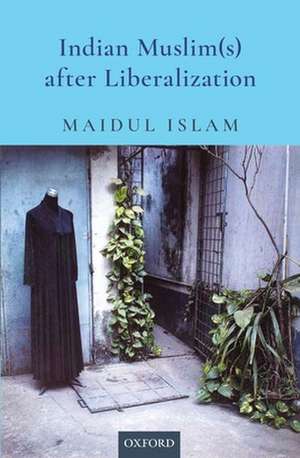Indian Muslim(s) After Liberalization
Autor Maidul Islamen Limba Engleză Hardback – 7 mar 2019
Preț: 261.47 lei
Preț vechi: 323.96 lei
-19% Nou
Puncte Express: 392
Preț estimativ în valută:
50.03€ • 53.50$ • 41.72£
50.03€ • 53.50$ • 41.72£
Carte disponibilă
Livrare economică 17-24 martie
Preluare comenzi: 021 569.72.76
Specificații
ISBN-13: 9780199489916
ISBN-10: 0199489912
Pagini: 336
Dimensiuni: 150 x 224 x 30 mm
Greutate: 0.48 kg
Editura: OUP INDIA
Colecția OUP India
Locul publicării:Delhi, India
ISBN-10: 0199489912
Pagini: 336
Dimensiuni: 150 x 224 x 30 mm
Greutate: 0.48 kg
Editura: OUP INDIA
Colecția OUP India
Locul publicării:Delhi, India
Recenzii
Well-researched publications since the Sachar Committee Report, 2006 are few and far between. The Sachar report brought together authentic empirical data on Muslims—the largest of the Indian minorities—and wrote analytical perspectives on social, educational, and economic levels in comparison to other socio-religious communities (SRCs). Indian Muslim(s) after Liberalization by Maidul Islam, therefore, is a welcome addition. It is topical and relevant to the contemporary social and economic growth discourses of India..this book highlights multiple concepts and issues on the status of the Muslim community in India and makes the reader think.
Maidul Islam presents a serious analysis of the Muslim predicament in the era of economic liberalisation. He gives a good overview of literature and sheds light on the contemporary debates on Muslim politics.
The book is indeed provocative in multiple senses. First, the author engages himself to explore the problems of the Muslim minorities and their identity formations in liberal-cum-neo-liberal India. Second, in order to unravel the complexity of identity, the author explores the theoretical possibility of investigating Muslims from the location of socio-economic and political marginalization of group identity. This is a feat in itself as such analytical framework was unthinkable three decades ago. Third, the book is a serious attempt to understand Muslim questions in terms of their democratic rights as citizens of India...Above all, the book is an important intellectual exercise to understand Muslim problems in a progressive theoretical context.
Maidul Islam presents a serious analysis of the Muslim predicament in the era of economic liberalisation. He gives a good overview of literature and sheds light on the contemporary debates on Muslim politics.
The book is indeed provocative in multiple senses. First, the author engages himself to explore the problems of the Muslim minorities and their identity formations in liberal-cum-neo-liberal India. Second, in order to unravel the complexity of identity, the author explores the theoretical possibility of investigating Muslims from the location of socio-economic and political marginalization of group identity. This is a feat in itself as such analytical framework was unthinkable three decades ago. Third, the book is a serious attempt to understand Muslim questions in terms of their democratic rights as citizens of India...Above all, the book is an important intellectual exercise to understand Muslim problems in a progressive theoretical context.
Notă biografică
Maidul Islam is Assistant Professor of Political Science at the Centre for Studies in Social Sciences, Calcutta. Previously he has taught Political Science at Presidency University, Kolkata and is the author of Limits of Islamism (2015).
